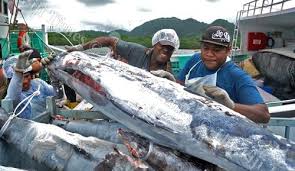A SCRUTINY of the Pacific Fishing Company Limited 2015 annual report by the Standing Committee on Economic Affairs has noted that consistent and sufficient supply of tuna remained to be a challenge for the Levuka-based cannery.
While tabling the annual report in Parliament last week, committee chairperson Lorna Eden also noted that tuna harvest within Fiji’s exclusive economic zone (EEZ) was limited to just 12,000 tonnes a year, whereas the capacity of PAFCO was 35,000 tonnes a year.
She said this meant that there would always be a need to buy from outside of Fiji’s EEZ.
Ms Eden said the committee recommended that relevant stakeholders be encouraged to pursue all avenues to assist PAFCO with this issue, and noted one possibility of looking into membership options for Fiji becoming a party to the Nauru Agreement, which currently controlled the vast majority of available stock in the region.
Another avenue she suggested was to revisit dialogue with island neighbour Kiribati who was renowned for their fish stocks.
She said talks with Kiribati were initiated back in 2010 with the aim to benefit PAFCO and in return, enable Kiribati to benefit from PAFCO’s expertise.
“Since that time, madam Speaker, PAFCO have started importing whole skipjack tuna and skipjack tuna flakes from the Marshall Islands on a similar concept.”
In his contribution to the debate, Opposition MP Prem Singh responded to the recommendation of addressing fish stock.
He said albacore tuna was a migratory species and Fiji did not have lots of tuna compared to our island neighbours – the famous Nauru agreement, which was an exclusive club of tuna rich resource nations.
“It is unfortunate that Fiji is not part of that agreement so we should try and get on board with these affluent nations who have a lot of stock,” Mr Singh said.
He said since PAFCO had a lot of capacity, they were moving in the right direction as far as importing tuna stock, skipper jack from Marshall Island.
“This will enable them to process more of the canned products because canned tuna is in a lot of demand for locals and overseas export, and the major and only distributor they have is Punja & Sons Limited. Punja & Sons, of course, are always after canned products so that they can supply both locally and through our trading partners.”
In response, Fiji’s Minister for Fisheries Semi Koroilavesau said the first thing that must be noted was that the current agreement with PAFCO operated on the agreement shared with Bumble Bee.
He said the company that actually controlled the fish that was supplied with Bumble Bee and PAFCO was Fong Chun Formosa (FCF), an independent company.
With Bumble Bee as the buyer of the processed fish, FCF is the fish broker that ensures constant supply of fish to PAFCO.
“PAFCO is only paid the processing cost of fish that are processed for Bumble Bee in the factory in Levuka. The canned products that are produced and labelled by PAFCO products hold a minimum percentage on what is processed in the processing facility.”
Mr Koroilavesau said this was where Government intervention was needed to attract an alternative source of raw materials for the local production of canned products.
He said the fact was Fiji was at the tail of the migratory tuna school that went around the Pacific.
“We are at the end tail of it. Tuna is firstly caught by Wallis and Futuna, Tuvalu, Kiribati, runs across the equator to Solomon Islands, Vanuatu then it comes to Fiji.
“When it comes to Fiji, we are basically feeding on the crumbs that have been left over by the countries north of us.
“I have personally visited PAFCO four times and I had meetings with Bumble Bee and PAFCO at least six times discussing the alternative source of fish that can be provided for Levuka. It has a lot of political angles because some of the nations in the Pacific like Kiribati and Tuvalu, about 60 per cent to 70 per cent of their annual budget is derived from tuna.
“The ability for us to negotiate with them, we also have to have a feel if we negotiate on a bigger scale of money that we have. We have a much bigger economy so the economies of these countries in the North are quite small and 60 and 70 per cent of their annual budget is derived from tuna and the licences that are paid to them.”
While also noting the recommendation to sign up to the Nauru Agreement, Mr Koroilavesau said it was important to realise that Fiji did not have skipjack fishing, which was the main content of that agreement.
He said skipjack was mainly caught in the northern part of the Pacific, which basically was caught by purse seine, the dragnet behind the fish and everything was hauled out from the school of tuna within that area.
“Due to climate change, Fiji has lost that opportunity where we used to have Ika Corporation and they used to use pole and line to catch skipjack tuna, but Fiji does not have that luxury of having skipjack tuna in our waters because the warm waters that used to be available in Fiji has moved further north, so the migratory pattern of skipjack has also gone with that.”






